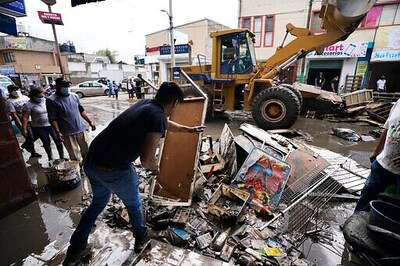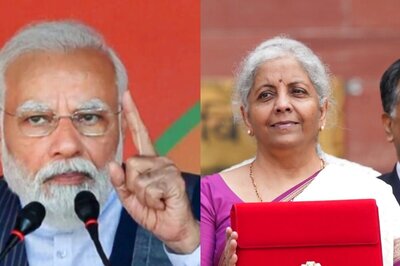
views
Cairo: Egyptian President Hosni Mubarak's government was to hold its first full meeting of a new cabinet on Monday since protests erupted against his rule with no sign yet of progress in talks with an opposition which wants him out.
Mubarak, who has refused calls to step down before September polls, has tried to focus on restoring order.
But protesters, camped out in Tahrir Sqaure in the heart of Cairo, have vowed to stay until Mubarak quits, and hope to take their campaign to the streets on Tuesday and Friday.
The banned Muslim Brotherhood was among the groups who met with officials over the weekend, a sign of how much has already changed in 13 days that have rocked the Arab world and alarmed Western powers.
But opposition figures reported little progress. While protesters are demanding that Mubarak must go immediately, many also worry that when he does go, he will be replaced not with the democracy they seek but with another authoritarian ruler.
Keen to get traffic moving around Tahrir Square, the army tried early on Monday to further squeeze the area the protesters occupied. Protesters rushed out of their tents to surround soldiers attempting to corral them into a smaller area.
Wary of the army's attempt to gain ground, dozens of protesters have slept inside the tracks of the army's vehicles.
"The army is getting restless and so are the protesters. The army wants to squeeze us into a small circle in the middle of the square to get the traffic moving again," Mohamed Shalaby, 27, a protester, told Reuters by phone.
The nation got back to work on Sunday and banks reopened after a week-long crisis with lines of customers seeking access to their accounts.
Many Egyptians, including those who took part in nationwide demonstrations last week against Mubarak's 30-year rule, are nonetheless desperate to get back to normal and worried about the impact of the crisis on stability and the economy.
The drop in the Egyptian pound was less sharp than many traders had expected on Sunday as the central bank appeared to support the currency.
But the pound could face renewed pressure on Monday when banks outside the Middle East reopen after the weekend.
Another confidence test will be a central bank auction of 15 billion pounds ($2.6 billion) of short-term Treasury bills, postponed from last week. The stock market is still closed.
Government ministers will hold their first full cabinet meeting on Monday since Mubarak reshuffled his cabinet on Jan. 28 in an attempt to mollify protesters enraged by years of corruption, economic hardship and political oppression.
BROTHERHOOD
But it is far from certain that the situation has been defused, despite appeals from longtime Mubarak backer the United States for an "orderly transition" to more democratic rule.
The presence at the talks of the banned Muslim Brotherhood, whose members have for years been repressed by Mubarak's feared security forces, was a significant development.
The government said after the meeting, chaired by Vice President Omar Suleiman, they agreed to draft a road map for talks, indicating Mubarak would stay in power to oversee change.
It would also move to release jailed activists, guarantee press freedom and lift Egypt's emergency laws. A committee was set up to study constitutional issues.
But the opposition said the government failed to meet their demand for a complete overhaul of the political system.
Abdel Monem Aboul Fotouh, a senior Brotherhood figure, said the government statement represented "good intentions but does not include any solid changes".
Opposition activists reject any compromise which would see Mubarak hand over power to Suleiman but also serve out his term -- essentially relying on the old authoritarian system to pave the way to full civilian democracy and saving his face.
Obama
Nobel peace laureate Mohamed ElBaradei, who has emerged as a figurehead for the opposition coalition, criticised the fledgling negotiations and said he was not invited.
"It is all managed by the military and that is part of the problem." he told NBC television in the United States.
Gamal Soltan, editor of the al-Mesryoon newspaper, said the protesters would not leave before their demands were met.
"The problem is that the regime's hesitancy in taking serious steps will lead to complications and the increase of the popular demonstrations and possibly force an army intervention," he said.
However, former cabinet member Rachid Mohamed Rachid, said: "I believe the presence of Mubarak in the next phase of transition for the next few months is very critical."
The United States, which had bankrolled Mubarak and the army to the tune of $1.3 billion a year, was taken by surprise by the uprising against a ruler it saw as a bastion against Islamic militancy and a friend, albeit a reluctant one, of Israel.
It has called for gradual change and an orderly transition but has given confused messages about when exactly it thought Mubarak should step down.
In Washington on Sunday, President Barack Obama said he believed Egypt was "not going to go back to what it was", and that the time for change was now. But in an interview with Fox News, he said only Mubarak knew what he was going to do.
Obama also said he believed the Muslim Brotherhood was only one faction in Egypt and that strains of their ideology were anti-American -- comments that could the anger the powerful Islamist group.


















Comments
0 comment